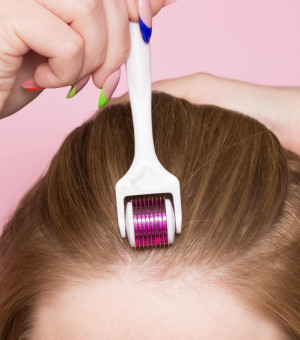Maybe you’ve noticed that your ponytail is thinner than usual or your part is wider than it used to be. You’re probably wondering whether your hair loss results from genetics, too-tight hairstyles, or a new product or medication.
But can mental health affect hair loss? Absolutely. Extreme stress has dramatic effects on the body. Hair loss is just one of the many ways that stress can manifest outwardly.
Significant emotional stress from the death of a loved one, losing a job, or navigating a global pandemic can cause hair loss. And when you’re worried about a receding hairline, a widening part, or hair falling out in clumps when you brush or wash it, that creates feelings of dread and further stress. Figuring out the underlying cause is the first step to escaping this seemingly endless cycle of stress and hair loss.
What causes hair loss?
Hair grows in a three-phase cycle. This can make it even harder to pinpoint how and why you’re experiencing hair loss since breakage could be mistaken for new growth, and some hair loss treatments cause more hair to fall at first.
There’s a range of factors and conditions that cause hair loss (both abrupt and gradual), including:
Alopecia affects millions of people worldwide. It is an autoimmune condition where the body attacks the hair follicles. Alopecia can be scarring or non-scarring and can even affect the eyebrows and eyelashes.
Androgenetic alopecia is characterized by either a receding hairline in an M shape or baldness spreading uniformly from the top of the head. It results from genetics and sensitivity to androdgens (hormones that play a key role in hair growth). This type of hair loss tends to occur very slowly, with the hair thinning and losing pigment over several years.
Alopecia areata appears as localized hair loss. You’ll likely notice hair coming in clumps or patchy circular bald spots. Many people will experience hair regrowth after about one year, while will others go through repeated hair loss and regrowth cycles. If you have this type of alopecia and it worsens, you should consult a dermatologist.
Telogen effluvium is a type of alopecia. It can be triggered by physical and psychological factors (such as medications and stress). This condition typically won’t begin to show until around three months after an emotionally distressing event.
Chemotherapy medications and drugs that suppress the immune system are known to trigger hair loss, which can then add to the stress of the health condition you’re already facing.
Hormonal imbalances might accompany stressful life changes like pregnancy or menopause. And as we know, extreme stress can trigger hair loss.
There are topical hair loss treatments on the market that can slow down or prevent the progression of your hair loss. But without knowing the real cause of your hair loss, it’s hard to know which ones will be effective. That’s why it’s important to consult a dermatologist.




